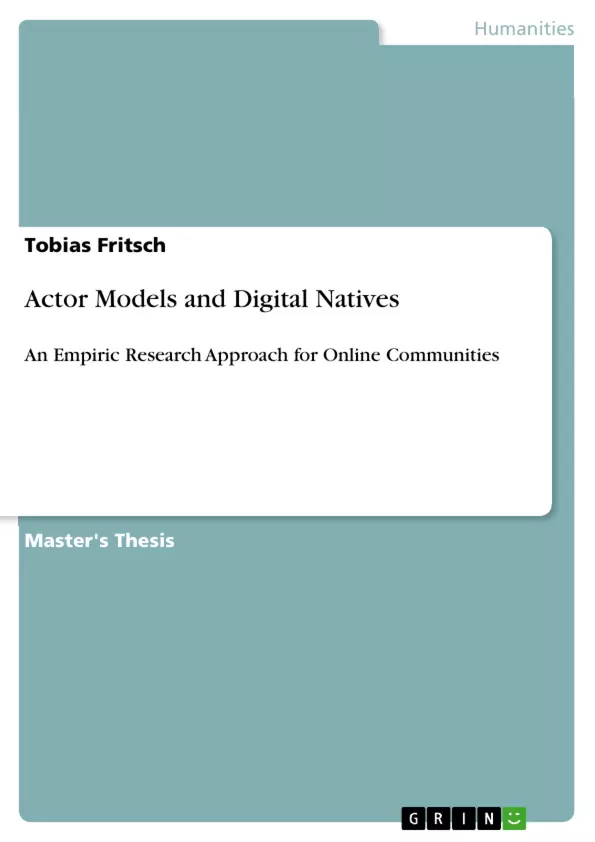This thesis evaluates the role of actor models with regard to the changes in virtual environments. The most commonly used actor models, the homo economicus and the homo sociologicus as well as the emotional man and several less popular models are compared with regard to their level of explanation for behavior in virtual environment. In this context online communities (i.e. gaming communities) are observed.
The research framework and the structural conception of the measurement also are explained in detail. A significant share of the input is based onto qualitative interviews with eight different digital natives, who share a common computer gaming affinity. The analysis includes qualitative interviews with these e-athletes concerning their behavior within online communities. These interviews contain interesting findings about their motivation, especially the difference between virtual and real world social relationships.
The analysis shows interesting results, since the players differentiate in between their role as an e-athlete versus their role as a person. This leads to a multi-causal influence for their behavior, which cannot sorely be explained with a single influence factor. Neither the homo economicus nor the homo sociologicus thus can explain their behavior on its own. Therefore this thesis discusses methods to improve the current models in order to adopt behavioral changes through virtual environments. A trade-off between the most commonly models is given. Afterwards the results of the analysis are compared to the statements of the interview partners. These interviews indicate a strong personal influence from the environment on the role of a private person. Additionally the behavior as an e-athlete is also influenced by logical decisions, which can be modeled through the homo economicus.
Inhaltsverzeichnis (Table of Contents)
- Introduction
- Abstract
- Scientific Contribution
- Structure of the Thesis
- Background
- Motivation
- Scientific Actor Models
- Homo Sociologicus
- Homo Oeconomicus
- Emotional Man
- Current Internet Evolution
- Target Group: Digital Natives
- Online Communities: Virtual Meeting points and Third Places
- Focus Gaming: E-Athletes and professional Gaming
- Research Framework
- Influence Factors and Operationalization
- Methodology
- Research Approach
- Analysis
- Social Network and Results
- Explanatory Value of Actor Models in Online Communities
- Comparison of the Explanatory Value within other Virtual Scenarios
- Discussion
Zielsetzung und Themenschwerpunkte (Objectives and Key Themes)
This thesis investigates the applicability of sociological actor models within the context of virtual environments, specifically online gaming communities. It aims to analyze the motivational factors driving the behavior of digital natives, especially e-athletes, in these virtual spaces.
- The role of actor models in explaining human behavior in virtual environments.
- The influence of online communities on the behavior of digital natives, particularly e-athletes.
- The compatibility of traditional actor models with the dynamic interactions observed in online communities.
- The development of an enhanced framework for understanding and predicting the behavior of digital natives in virtual settings.
- The impact of the virtual environment on the motivational factors driving individual behavior.
Zusammenfassung der Kapitel (Chapter Summaries)
- Introduction: This chapter introduces the concept of actor models and their importance in understanding human interaction. It discusses the interdisciplinary nature of actor model research and highlights the evolving role of virtual environments. The chapter also provides a brief overview of the thesis's aims and methodology.
- Background: This chapter delves into the motivation behind this research, exploring the need for a deeper understanding of how virtual environments influence human behavior. It introduces several prominent actor models, including Homo Sociologicus, Homo Oeconomicus, and Emotional Man, analyzing their strengths and limitations. The chapter then discusses the ongoing evolution of the internet, specifically focusing on the characteristics of digital natives and the role of online communities as virtual meeting points and third places.
- Research Framework: This chapter lays out the research framework used in the thesis, including the key influence factors, operationalization techniques, and the methodology employed. It outlines the research approach, which utilizes both qualitative and quantitative data from interviews with e-athletes and an online gaming community.
- Analysis: This chapter presents the results of the data analysis, focusing on the social network within the online gaming community and the explanatory power of different actor models. It analyzes the behavior of the e-athletes, highlighting the interplay between rational and social influence factors within the virtual environment.
Schlüsselwörter (Keywords)
This thesis examines the application of sociological actor models, such as Homo Sociologicus and Homo Oeconomicus, within the context of virtual environments, particularly online gaming communities. The research focuses on digital natives, e-athletes, and their behavior in these virtual spaces, exploring the influence of motivation and social factors on their interactions. It aims to evaluate the suitability of existing actor models in explaining the dynamics of virtual communities and to contribute to a more nuanced understanding of the impact of technology on human behavior. Key concepts include digital natives, online communities, virtual environments, actor models, motivation, social influence, and e-sports.
Frequently Asked Questions
What is the "Homo Oeconomicus" model?
It is an actor model that assumes humans act as rational, self-interested agents maximizing their own utility.
Can traditional actor models explain the behavior of "Digital Natives"?
The thesis shows that neither "Homo Oeconomicus" nor "Homo Sociologicus" alone can fully explain behavior in virtual worlds; a multi-causal approach is needed.
How do "E-Athletes" differ from their real-world personas?
Interviews reveal that players often differentiate between their professional role as an athlete and their private role as a person, leading to different behavioral patterns.
What role do online gaming communities play as "Third Places"?
They serve as virtual meeting points that influence social relationships and provide a space for interaction outside of home and work.
What is the "Emotional Man" model?
This model focuses on human behavior driven by emotions and psychological factors rather than pure logic or social norms.
- Arbeit zitieren
- Dr. Tobias Fritsch (Autor:in), 2010, Actor Models and Digital Natives, München, GRIN Verlag, https://www.grin.com/document/163758



